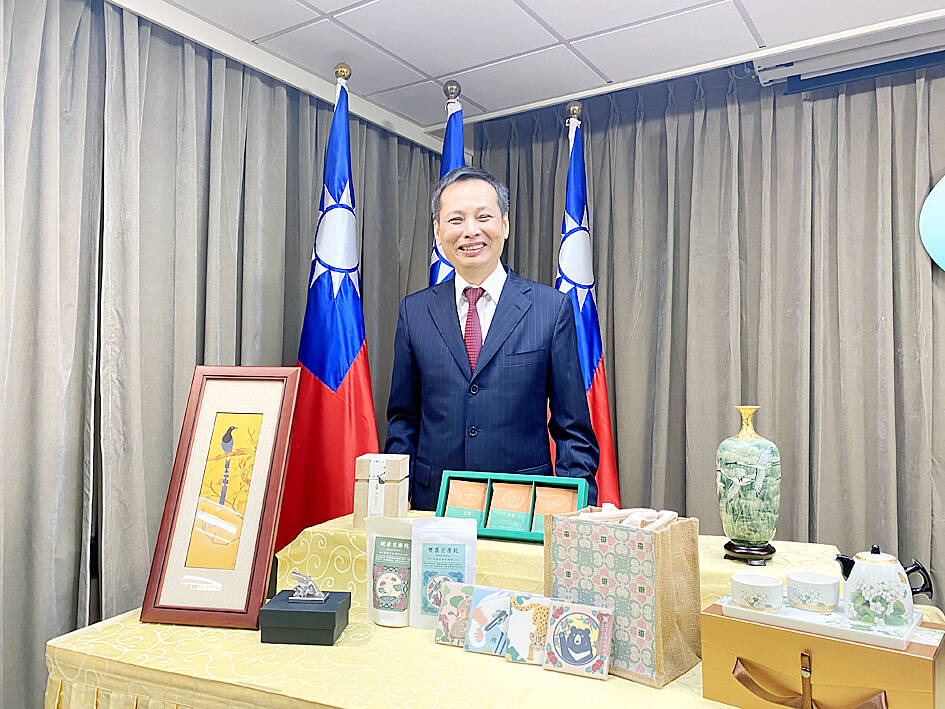The Ministry of Foreign Affairs (MOFA) last week unveiled an array of the type of Taiwan-themed gifts it regularly gives to visiting foreign dignitaries, which the ministry said are designed to leave overseas guests with a lasting impression of the country.
Department of General Affairs head Bruce Hung (洪振榮), who is in charge of preparing the giveaways, showed off the gifts on Tuesday last week and explained why they were selected.
The ministry usually picks light, handy and easy-to-pack gifts that can fit easily into the luggage of visiting dignitaries, who might have to travel to other destinations after Taiwan before returning home, Hung said.

Photo: Yang Yao-ju, Taipei Times
In the past few years, the ministry has favored gifts with Taiwanese motifs, including endangered indigenous animals or flora, to promote Taiwanese arts and culture and the environment, to try to leave guests with a positive lasting impression of the country, he said.
Some of the most popular gifts include a Hakka tung blossom tea cup and plate set, and traditional Taiwanese decorative tiles with images of Formosan black bears, Formosan blue magpies and Taiwan’s leopard cats, he said.
Traditional Hakka indigo-dyed products, and paperweights shaped like the figures in late Taiwanese sculptor Ju Ming’s (朱銘) widely acclaimed Taichi series are also popular and well-liked by foreign guests, the official said.
Taiwan’s famous Alishan Jinsyuan oolong tea and Taitung Luye red oolong tea are also great gifts for visiting dignitaries who are tea lovers, Hung said.
However, the ministry seeks to avoid some gift-giving blunders, such as not factoring in the maximum value some countries set for a gift to government officials or the need of some dignitaries to publicly report their gifts, he said.
Another consideration are zodiac animals, which are frequently featured on the ministry’s gifts.
Two of the 12 animals — the pig and the dog — are considered unclean or impure in Muslim cultures and should not be included in gifts to guests from certain countries, such as Malaysia, Hung said.
Hung, a former envoy to Australia posted in Brisbane, said that officials from Australia and New Zealand are extremely interested in gifts related to Taiwan’s indigenous peoples, as the countries also have rich indigenous cultures.
“Every time I see gifts given by MOFA in the office of a foreign guest when I travel overseas, I know we’re doing a good job promoting Taiwan,” he said.

A magnitude 4.9 earthquake struck off Tainan at 11:47am today, the Central Weather Administration (CWA) said. The hypocenter was 32.3km northeast of Tainan City Hall at a depth of 7.3km, CWA data showed. The intensity of the quake, which gauges the actual effect of a seismic event, measured 4 in Tainan and Chiayi County on Taiwan's seven-tier intensity scale, the data showed. The quake had an intensity of 3 in Chiayi City and County, and Yunlin County, while it was measured as 2 in Kaohsiung, Nantou County, Changhua County, Taitung County and offshore Penghu County, the data showed. There were no immediate reports of

‘DENIAL DEFENSE’: The US would increase its military presence with uncrewed ships, and submarines, while boosting defense in the Indo-Pacific, a Pete Hegseth memo said The US is reorienting its military strategy to focus primarily on deterring a potential Chinese invasion of Taiwan, a memo signed by US Secretary of Defense Pete Hegseth showed. The memo also called on Taiwan to increase its defense spending. The document, known as the “Interim National Defense Strategic Guidance,” was distributed this month and detailed the national defense plans of US President Donald Trump’s administration, an article in the Washington Post said on Saturday. It outlines how the US can prepare for a potential war with China and defend itself from threats in the “near abroad,” including Greenland and the Panama

The Chinese Nationalist Party (KMT) is maintaining close ties with Beijing, the Democratic Progressive Party (DPP) said yesterday, hours after a new round of Chinese military drills in the Taiwan Strait began. Political parties in a democracy have a responsibility to be loyal to the nation and defend its sovereignty, DPP spokesman Justin Wu (吳崢) told a news conference in Taipei. His comments came hours after Beijing announced via Chinese state media that the Chinese People’s Liberation Army’s Eastern Theater Command was holding large-scale drills simulating a multi-pronged attack on Taiwan. Contrary to the KMT’s claims that it is staunchly anti-communist, KMT Deputy

RESPONSE: The government would investigate incidents of Taiwanese entertainers in China promoting CCP propaganda online in contravention of the law, the source said Taiwanese entertainers living in China who are found to have contravened cross-strait regulations or collaborated with the Chinese Communist Party (CCP) could be subject to fines, a source said on Sunday. Several Taiwanese entertainers have posted on the social media platform Sina Weibo saying that Taiwan “must be returned” to China, and sharing news articles from Chinese state media. In response, the Mainland Affairs Council (MAC) has asked the Ministry of Culture to investigate whether the entertainers had contravened any laws, and asked for them to be questioned upon their return to Taiwan, an official familiar with the matter said. To curb repeated